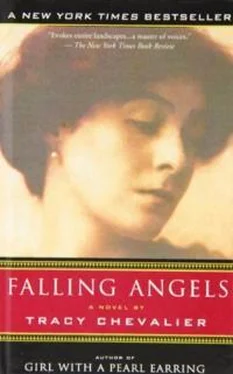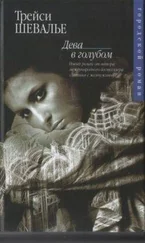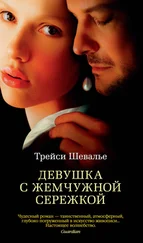She was in her element, speaking so smoothly and gently and yet also forcefully that several women indeed took away pamphlets and left coins by the door-myself included, I am ashamed to admit. When the pile of pamphlets reached me, Caroline Black was watching me with such a sweet smile on her face that I had to take one. I could not bring myself to hide it down the back of the sofa as I might have liked. I did that later, at home.
Kitty Coleman did not take the floor in quite the same way as Caroline Black, but she was still in an excited state, her eyes glittering, her cheeks flushed, as if she were at a ball and had not stopped dancing once. She did not look entirely healthy.
I know I should not say this, but I wish she and Caroline Black had never met. Kitty’s transformation has been dramatic, and undoubtedly it has pulled her out of the bad way she was in, but she has not gone back to her old self-she has changed into something altogether more radical. Not that I was greatly enamored of her old self, but I prefer that to her present state. Even when she is not at her At Homes with suffragettes everywhere, she still talks incessantly about politics and women this and women that till I want to cover my ears. She has bought herself a bicycle and goes around even in the wind and rain, getting grease marks all down her skirts-if they are not already covered in chalk from all the signs she has been drawing on pavements about meetings and rallies and such. Whenever I find her crouched somewhere with a bit of chalk, I cross the road and pretend not to see her.
She is never at home now in the afternoons, but always at a meeting, and neglects poor Maude shamelessly. Sometimes I think of Maude as my third daughter, she is at our house so often. Not that I am complaining-Maude is very thoughtful, helping me with tea or Ivy May with her schoolwork. She sets a good example for Lavinia, who I am sorry to say never seems to take it up. It is very peculiar that one daughter can have a mother who pays her no attention and yet turns out well, while the other gets all the attention in the world and yet is so difficult and selfish.
It was a relief to leave Kitty’s At Home. Lavinia seemed eager to come away as well. Back home she was very kind to me, sending me off to bed to nurse my head while she insisted on making supper. I don’t even mind that she burned the soup.
Lord, I hope these At Homes don’t last. Since the missus switched ‘em to Wednesdays I’m run off my feet. At least I’ve got Maude to help-though I don’t know that she’ll stick it. The whole afternoon she looked like she wanted to bolt, even when Lavinia came to keep her company.
That one makes me laugh. When she’s here she watches the missus with an outraged look on her face. And when the master’s home, she looks at him all puzzled and sorrowful. She hasn’t said nothing, though, nor tried to send another letter-I’ve kept an eye out. I’ve no intention of letting her wreck this house-I need my wages. As it is I’m not managing to pay for Jack. Or I am, but I’ve had to do something I never thought I’d stoop to-taking spoons to sell from an old silver set in the sideboard what the missus’s mum left her. They don’t use it, and no one but me ever polishes it. It ain’t right, I know, but I don’t have no choice.
I finally listened to them suffragettes today as I passed round the scones. What I heard made me want to spit. They talk about helping women but it turns out they’re choosy about who exactly gets the help. They ain’t fighting for my vote-only for women who own property or went to university. But that Caroline Black had the nerve to ask me to donate some of my wages “for the cause.” I told her I wouldn’t give a penny until the cause had anything to do with me!
I were so mad I had to tell Mrs. Baker about it when we were washing up afterward.
“What did she say to that?” Mrs. Baker asked.
“Oh, that men would never agree to give the vote to everyone all at once, that they had to start with some women and once they’d secured that they would fight for everyone. But ain’t it always the way, that they put themselves first? Why can’t they fight for us first, I say? Let workingwomen decide what’s what.”
Mrs. Baker chuckled. “You wouldn’t know who to vote for if they bit you on your arse, and you know it.”
“I would!” I cried. “I ain’t that stupid. Labour, of course. Labour for a laboring woman. But these ladies upstairs won’t vote Labour, or even Liberal. They’re all Tories like their husbands, and them Tories’ll never give the vote to women, no matter what they say.”
Mrs. Baker didn’t say nothing. Maybe she was surprised I was talking politics. To be honest, I were surprised at myself. I’ve been round too many suffragettes-they’re starting to make me talk a load of rubbish.
Daddy and I were on the heath when I felt it. It was our Friday night together, and we had set up the telescope on Parliament Hill. We had looked at a few stars and were waiting for Mars to appear. I didn’t mind the wait. Sometimes we talked, but mostly we simply sat and observed.
As I was sipping a cup of tea from our flask I began to feel a dull ache in my stomach, as if I had eaten too much. Yet I had hardly touched Mrs. Baker’s welsh rarebit at supper-I am never hungry in hot weather. I shifted on my folding stool and tried to concentrate on what Daddy was saying.
“At the society meeting recently someone said the opposition of Mars is likely to be very good this month,” he said. “I don’t know if this telescope is powerful enough. We should have borrowed the society‘s, though someone else may have it tonight. All this will be a damn sight easier when the observatory is built.”
“If it is built,” I reminded him. The Hampstead Scientific Society had been trying to find a site on the heath where it could build an observatory, but there had been objections to each spot, with a debate raging about it on the letters page of the local paper.
The place between my legs itched: it was damp there, as if I had spilled tea in my lap. Suddenly I understood what was happening. “Oh,” I said before I could stop myself.
Daddy raised his eyebrows.
“It’s nothing. It‘s-” I stopped, wincing with pain.
“Are you all right, Maude?”
The pain was suddenly so strong I could barely breathe. It ceased for a moment and then began again, like a hand clamped over my stomach, squeezing then letting go.
“Daddy,” I gasped, “I’m not feeling well, I’m afraid. I’m so sorry, but I have to go back.”
Daddy frowned. “What is it? What’s wrong?”
I was so embarrassed I hardly knew what to say. “It’s… something I need to see Mummy about.” Immediately I wished I had simply said I had a stomachache. I am not much good at lying.
“Why-” Daddy stopped. I think he understood. At least he did not ask more questions. “I’ll see you back,” he said, reaching for the wingnut that held the telescope to its stand.
“I can go on my own-it’s not far, and you don’t want to have to set up everything all over again.”
“Of course I’ll see you back. I won’t have my daughter wandering about alone on the heath at night.”
I wanted to tell him that since Mummy became so busy with the suffragettes, I’d begun going all over on my own-to the cemetery, up to the village, even across the heath to Hampstead. Sometimes Lavinia came with me, but often she was too nervous to go far. But now was not the time to say such things to Daddy. Besides, he did not know how deeply involved Mummy had become-she talked about woman’s suffrage with everyone but him, and for the most part confined her WSPU activities to the daytime, and nights when she knew Daddy was busy. For all he knew, she sat at home every day reading and gardening, as she used to.
Читать дальше







![Трейси Шевалье - Тонкая нить [Литрес]](/books/386177/trejsi-shevale-tonkaya-nit-litres-thumb.webp)




